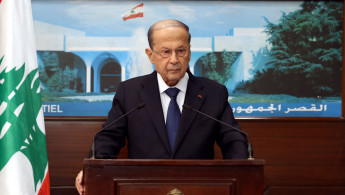Saudi, Kuwaiti ambassadors meet Lebanese president Aoun in sign of improving ties
Lebanese President Michel Aoun met with Saudi Arabia and Kuwait’s ambassadors this week, days after the two diplomats returned to Beirut in a sign of easing tensions.
Aoun held a short meeting with Saudi ambassador Waleed Bukhari on Wednesday, who reiterated Riyadh’s keenness to support Lebanon during its unprecedented economic crisis, local media reported.
الرئيس عون استقبل سفير المملكة العربية السعودية في لبنان السفير وليد البخاري pic.twitter.com/QkTJH5Wfsj
— Lebanese Presidency (@LBpresidency) April 13, 2022
Bukhari briefed Aoun on the mechanism of the joint Saudi-French fund announced earlier this year, according to local media, which will provide humanitarian aid by focusing primarily on healthcare and food distribution, targeting Lebanon’s most vulnerable communities.
Although Bukhari left the Baabda Presidential Palace without speaking to the press, presidential sources said the meeting was "positive" and emphasised the need to reactivate bilateral relations between Beirut and Riyadh.
Since returning to Lebanon, Bukhari has held a number of meetings with political and religious officials, as well as Iftars – the sunset meal people break their fast with during Ramadan – raising questions about Saudi policy weeks before the Lebanese parliamentary elections.
Bukhari also met with military and security officials on Tuesday and discussed efforts by Lebanon to stop the smuggling of drugs to the kingdom.
On Thursday, Aoun met with Kuwaiti ambassador Abdel Aal Al-Qenai, who said the previous diplomatic spat between Lebanon and the Gulf countries was an issue that has now been resolved.
"Lebanon’s [positive] response to the Kuwaiti initiative prompted the Gulf to send back their ambassadors to Lebanon and restore relations with it to how they were, [based] on brotherhood and strength," said Al-Qenai.
سفير دولة الكويت في لبنان عبد العال القناعي بعد لقائه الرئيس عون: تجاوب الجانب اللبناني مع المبادرة الكويتية جعل دول الخليج تعيد سفراءها الى لبنان، والعلاقات معه الى ما كانت عليه من اخوّة ومتانة وقوة pic.twitter.com/PRirkWtUjs
— Lebanese Presidency (@LBpresidency) April 14, 2022
Ties hit rock bottom last year when Saudi Arabia, Kuwait and Bahrain withdrew their envoys in late October. Relations had been strained for years by the growing influence of the Iran-backed Hezbollah militia.
The envoys left Beirut following comments made by a former government minister who criticised the Saudi-led military coalition fighting in Yemen, a conflict widely seen as a proxy war between Saudi Arabia and Iran.
Hezbollah supports Tehran in its regional struggle for influence with US-allied Gulf Arab states and the group has been accused by Gulf countries of providing material aid to Yemen's Houthi rebels.





 Follow the Middle East's top stories in English at The New Arab on Google News
Follow the Middle East's top stories in English at The New Arab on Google News
![The UAE is widely suspected of arming the RSF militia [Getty]](/sites/default/files/styles/image_330x185/public/2024-11/GettyImages-472529908.jpg?h=69f2b9d0&itok=Yauw3YTG)
![Netanyahu furiously denounced the ICC [Getty]](/sites/default/files/styles/image_330x185/public/2024-11/GettyImages-2169352575.jpg?h=199d8c1f&itok=-vRiruf5)
![Both Hamas and the Palestinian Authority welcomed the ICC arrest warrants [Getty]](/sites/default/files/styles/image_330x185/public/2024-11/GettyImages-2178351173.jpg?h=199d8c1f&itok=TV858iVg)